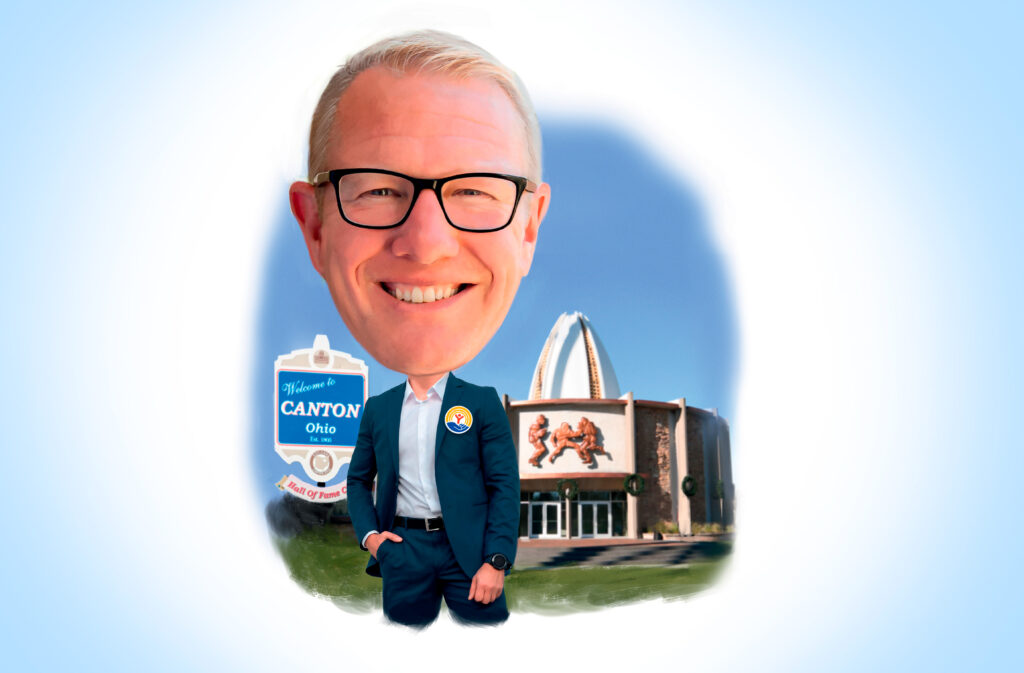
Proactive Is Not Active Enough

Other men should hate Johnny Pitts. They really should. He is an Eagle Scout, a triathlete, a former King of the Memphis Cotton Carnival, a stalwart member of the Independent Presbyterian Church and a mentor to and patron of underprivileged teens. He has a lovely wife, a hunting lodge, three perfect children, a full head of pure-silver hair and four Lexus SUVs.
And he is successful. He and his partner, Mat Lipscomb, have increased the business of their insurance firm, Lipscomb and Pitts, seven-fold in 14 years
But do the men of Memphis hate Johnny Pitts? Well, no.
“Quite the opposite is true,” says Blair Gilbert, his best buddy since high school. “People just like being around Johnny. Anybody he meets, he makes comfortable. He has this magnetic presence.”
And Pitts knows a lot of people.
“Memphis is a town of about a million people,” says Gilbert, “but anywhere you go with Johnny, he knows six or seven of them.”
It helps to be a lifelong resident of Memphis, but Pitts pushes his network further by running the wildly successful Lipscomb and Pitts Breakfast Club, a moving, shaking, do-gooding association that local businessmen are willing to pay $13,500 to $18,500 to join. With its 60 member companies (no two in the same business), the LPBC entertains about 320 people, half of them guests, at its monthly Signature Breakfasts.
At these events, the networking is not as casual as just putting a bunch of sausages in front of a bunch of suits. Pitts estimates that about 60% of the breakfast eaters are decision makers for their firms. “We track all the guests that go to the breakfasts,” says Pitts. “It’s very much a prospecting machine. We have info on everybody.”
The seats are assigned, sometimes by personal preference and sometimes for matchmaking. “We’ll ask our clients if there’s somebody they want to meet,” Pitts says. And then, one way or another, he’ll make it happen. “This way, the clients are able to generate new business relationships,” says Jeremy Park, the marketing director who does most of the arranging.
Because the event is so tightly branded with the insurance brokerage, “there’s no way they can leave that room without knowing who we are,” says Pitts. “A little later we call to say hi and thanks for coming, and that decision maker may say, ‘Hey, I meant to talk to you about insurance.’”
But there are two more legs to this stool. One is the featured motivational speakers from the worlds of business and sports, who are hired from several speakers bureaus. (Speakers have included Greg Gumbel, coach Ken Carter and writer Frank Deford.) The speakers are often also recruited to talk to local youth from Junior Villages—a Pitts charity of choice—the night before.
The night before basketball commentator Jay Bilas spoke to the LPBC, he met “200 inner city kids and talked to then about life,” says Pitts. “He later wrote to me and said he’d felt really invigorated talking to those kids and would rather do that than talk to CEOs.”
The third leg, not the least important, is to work together to engage the community in good works. The club has a Charity Spotlight table six times a year at the breakfast. The charity’s executive director speaks, and the organization gets a check for $3,500. This helps make the club, and specifically Pitts, a conduit for fundraising in Memphis. “I’ll get calls in late December,” he says, saying, ‘I gottta get rid of $50,000 today. Whom should I give it to?’”
The club also organizes volunteer days, giveback afternoons, days when 300 volunteers pick up trash, plant flowers and tutor kids. Club members have organized a Red Cross telethon and an evening for Haiti relief. And because of its long branches into the community, quick arrangements are made for venues, billboards and press coverage.
The club next started a cultural connection to build awareness of the local arts. Since, as Pitts puts it, “We’re like the center of the city,” it is no surprise that 15 breakfast club members, including Pitts, sit in a kind of kitchen cabinet with Mayor A. C. Wharton, advising him on improving customer service to citizens. “We’re helping the mayor, the Chamber of Commerce, and just about every nonprofit in town,” says Pitts.
While the breakfasts and about 100 other annual events, including golf tournaments, volunteer days, executive lunches and seminars, cost Lipscomb and Pitts a half million dollars a year, “It far and away pays for itself,” says Pitts.
“We’ve gotten as much brand awareness in the past five years as we did in the 55 years of random marketing before that,” says Pitts. “Our business is up.”
And, he adds, “It’s great for recruiting. People want to work here. We are the place to be. We lost just one person in the last two years.”
“Networking organizations are a dime a dozen,” says Park. “You can go every day and every night. This one is 100% about higher goals. Raising money for organizations that need it and relationships with a purpose. Networking is just an offshoot of what we’re all about.”
Little wonder that “we turn down three applications for every one we get in,” says Pitts. “Most of our major categories are filled, but we still get 10 to 15 emails a week from people who want to get involved.” Those people are invited to participate in volunteer events.
Before Breakfast
Lipscomb and Pitts has come a long way from the two-man firm founded in 1958 by Liberty Mutual refugees John Pitts and Matthew Lipscomb, the fathers of the current partners. At first, they did personal lines only; then, they added commercial policies a few years later.
Meanwhile, young Johnny and Mat grew up together working summers in the mailroom. Pitts claims he had a “normal childhood” but with two unusual achievements. While running during a PE class in high school, the teacher pulled him aside and said, “You. You’re on the track team now.”
He later ran for the University of Tennessee team, “scrub team, not a big deal,” and still runs two hours a day. Recently, Pitts won the West Tennessee District of the Tennessee State Senior Olympics in the 50-54 age group (he is 52), capturing the gold medal in the 1,500-meter run and the 5,000-meter run, a silver in the 800-meter run and the 5,000-meter cycle, and a bronze in the 400-meter run.
His other achievement was becoming an Eagle Scout, achieved by only 2% of Boy Scouts. “You’ve got to do it by your 18th birthday, and it’s difficult to do,” says Pitts. “Once you get that rank, you are and remain an Eagle Scout. It’s very present tense. You’re taught how to lead. When I see Eagle Scout on a resume, that’s the one I read.”
Pitts, his late father, and his son Rob are a rare three-generation Eagle Scout family. “When I was 14, my dad gave me a choice: I could be an Eagle Scout, or I could just laze around, hang out with girls and not have a car and driver’s license. Which would it be? I said the same thing to my son.”
One summer after his freshman year in college, Johnny impressed his father by starting a small hanging-plant business with buddy Blair Gilbert. They bought plants from a wholesale nursery for $6 each and sold them out of a rented truck, door to door, in office buildings for $14 each. Pitts Sr. got his seed loan back the very first weekend.
“We did that every summer after that and made some $2,000 a week,” Pitts says. “I never had to ask dad for any money.” The experience taught him about “all the issues you run into running a business. It’s developing relationships with the gatekeepers at the front desk, promising the receptionist a free plant if she helps. It really helped me learn about how to approach someone, how to deal with rejection, objections, how to create a deal and how to close a deal.”
As his plant partner Gilbert remembers it, “Johnny could sell circles around me. I’d be flopped down tired, and he had all this energy. He just kept going.”
After the third summer, Pitts said, “I knew that selling was what I wanted to do.”
Pitts still didn’t think he was going into the business until one day his dad drew up a list of the pros and cons of an insurance career.
“There were more pluses, like meeting people, developing relationships, making your own schedule, and a good living. The only minus was the initial slow pace of income. Dad made a chart showing how my friends who went into banking and lawyering had this steady rise. My potential growth looked like a hockey stick. Still, I thought, I’d be stupid not to do this. If I can sell ferns, I can sell insurance.”
Like many an insurance scion, Pitts got his early training elsewhere: Safeco, and then CIGNA, working in the underwriting, loss control and claims departments. In 1981, he finally landed at Lipscomb and Pitts as a producer. The young Lipscomb had arrived three years before.
“I got the same start as anyone: a telephone book, a phone and a table. I learned by bumps and bruises. That first year I made $10,800. By the time I was 25 and buying Kim an engagement ring, I was making $40,000 a year.”
In 1989, the elder Lipscomb and Pitts gave the younger Lipscomb and Pitts management of the company. “They had plotted this,” says Pitts. “For three years, they let us make decisions on just about everything.”
And in 1992, also according to plan, they bought their fathers out.
Remaking the Family Firm
What they acquired was “a small company, a few salesmen and a few staff. When we started we had 15 employees, all personal lines and small commercial. We wanted to grow into other stuff. Mat and I sat down and made a plan. The foundation and support staffs were fine. But we got rid of some people and started hiring college graduates and taught them insurance, instead of hiring insurance people and teaching them to sell.”
Another technique the two used was to “actually visualize where we wanted to be in five years, what would the firm would look like, what type of clientele we would have. We visualized the details and put it into writing, telling our story as though it had already occurred or was about to occur. The self-accountability that you put upon yourself is so strong that there’s no going back.”
Now, they specialize in designing risk management for growth-oriented middle-market companies. Seventy percent of their business is commercial property, 25% is employee benefits, and 5% is personal lines for high-net-worth individuals.
Pitts is also proud of the benefits it offers employees, including modified work schedules, family nights at a local theater and ball games, and a rare adoption assistance program.
All this happens while Pitts maintains an extracurricular schedule that would derail a lesser man. In 2004, for example, he served as King of the Memphis Cotton Carnival, which he describes as “like Mardi Gras but with charity work.” The annual king represents his industry for the entire year at social, business and fundraising events.
“If you’re asked to do it, it’s pretty time consuming,” he says. “A lot of partying time, publicity and press—and two royal costumes—one for day and one for night. The best part is bringing toys to kids at the Ronald MacDonald house or St. Jude’s hospital. They think you’re a king!”
He is also involved in Scout Reach Memphis, which brings scouting to the inner city.
“I’m really proud of this. A lot of the kids haven’t been two miles outside the neighborhood. For them to camp out is awesome. They see the stars, hear the crickets. It’s pretty cool to watch. They’re all tough, but in the woods they’re different.”
He is a previous board member and still a mentor for Youth Villages, the Tennessee-based organization that serves emotionally and behaviorally challenged children in 11 different states.
“The energy the guy has is amazing,” says Gilbert. “Boundless. He puts a lot of energy and enthusiasm into whatever he’s doing. Because he’s got this optimistic attitude he goes after everything with a can-do approach.”
Pitts, says Gilbert, “would go crazy if he had to sit at his desk 10 hours a day. He has a well balanced life and he sure knows and understands the business, too.”
Where does all the time come from? Pitts paraphrases an old saw: “Busy people find the time. I’m very, very organized—very structured. I work out two hours a day. Go home. Shower. Then go to a social event.”
“As I get older, too, I’m learning to scrape off the little things and focus on the bigger things. Plus, I have a very supportive wife.”
Pitts’ equally active wife, the former Kim Swann, also runs, teaches Pilates, presides over the Lebonheur Club for the benefit of Lebonheur Hospital, and is active in the local garden club.
“If you live somewhere, you might as well dig in deep,” Pitts says. “We know we’re not going to move. We all have a stake in our city. How are we going to make where we live better and raise our families better? We’ve found that the way to get what you want is to give.”
The Pitts File
Family: Wife, Kim Swann, of 26 years; daughter Jennings, 23, a banker; son Rob, 21, a business major at High Point University (“He’s the school record holder in the indoor 600 meter run,” says a proud Dad); daughter Mary Carson, 15, a sophomore at St. Paul’s School in Concord, N.H., and “Hutchison School record holder in the pole vault.” (Sometimes, all five in the family will enter a local 5k together in different age groups.)
Home: Memphis, plus a house in Destin, Fla., and a hunting and fishing lodge in Arkansas
Ride: “The reliable and functional Lexus SUV. It does everything. I can take it hunting in the morning and then wash it and take my wife to a black tie event that night. I’ve got four of them.”
Other Toys: Hunting and fishing boats, four-wheel ATVs
Business Associations: Director on The Council, Assurex Global board, Large Insurers of Tennessee, advisory boards for several insurers
Do Gooding: Youth Villages, Boy Scouts, Brooks Museum of Art Museum, Spotlight Charities
Sports: Running, biking, triathlons, and climbing. He and his family plot a Pitts BLT (Bucket List Trip) each year, involving extreme physical challenges. This year, he and Rob climbed Mt. Whitney.
Fandom: University of Tennessee football, Tour de France, and track meets




